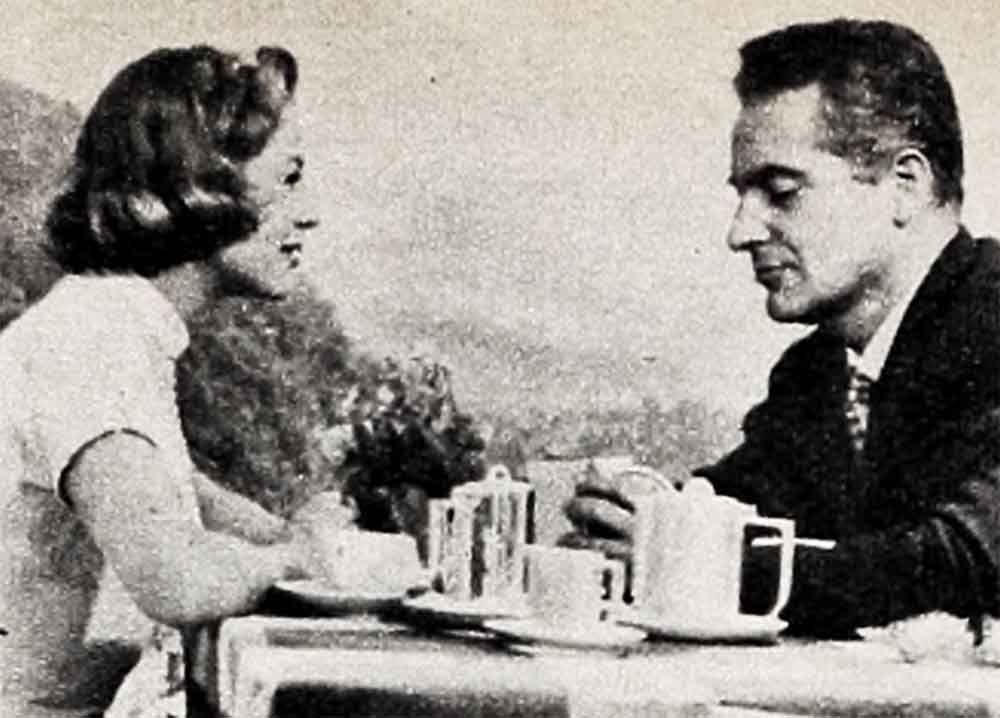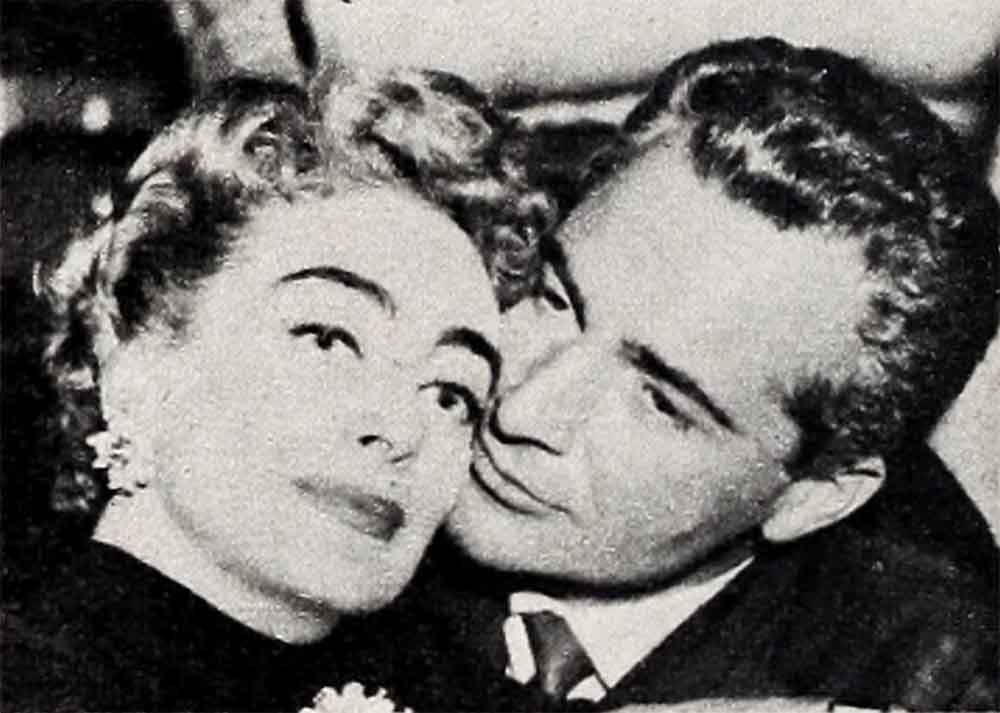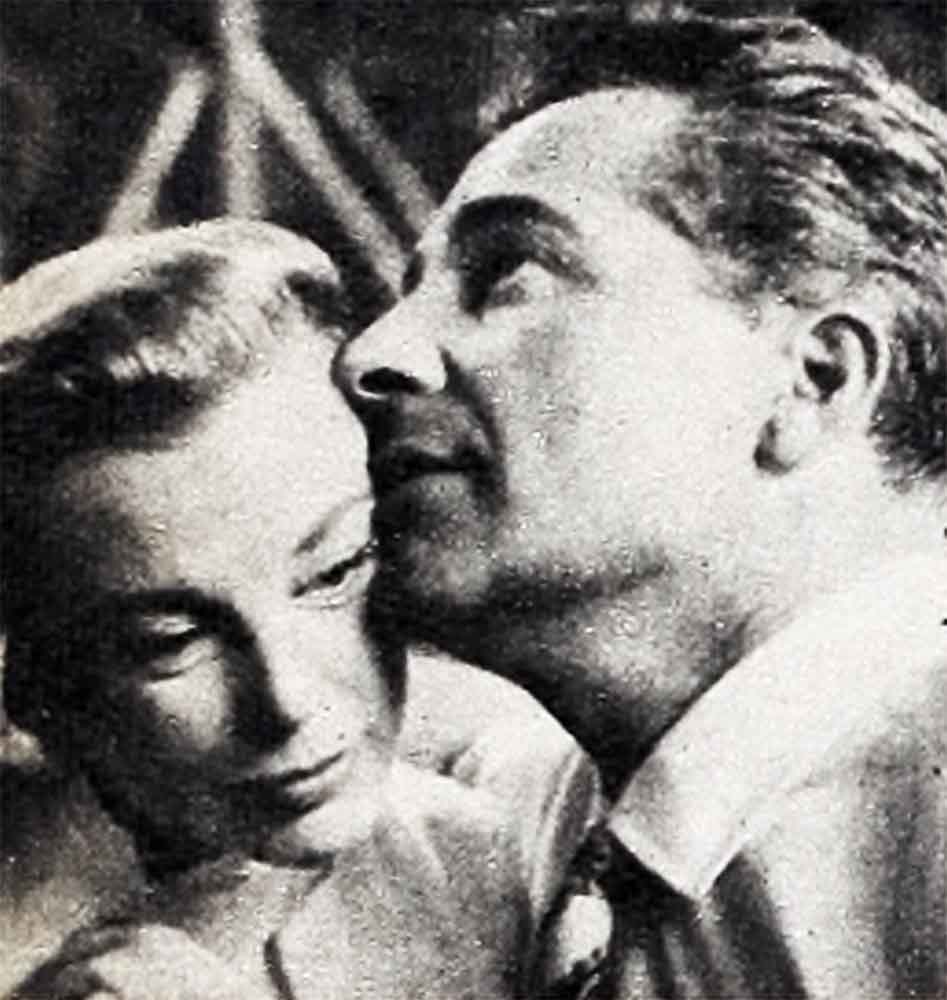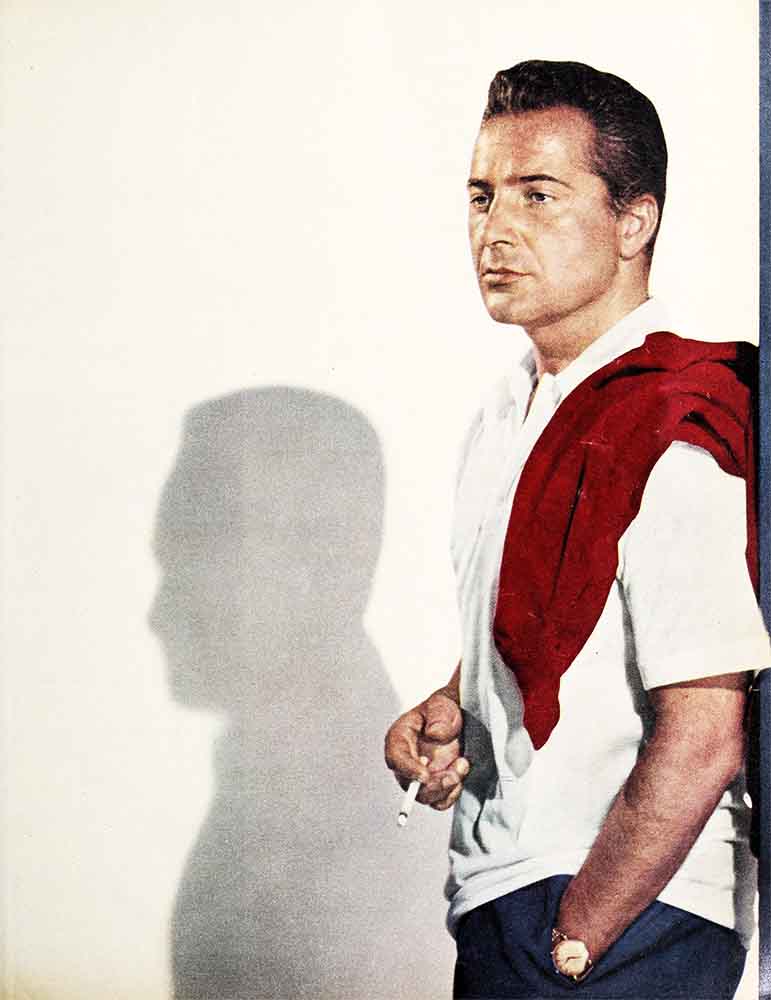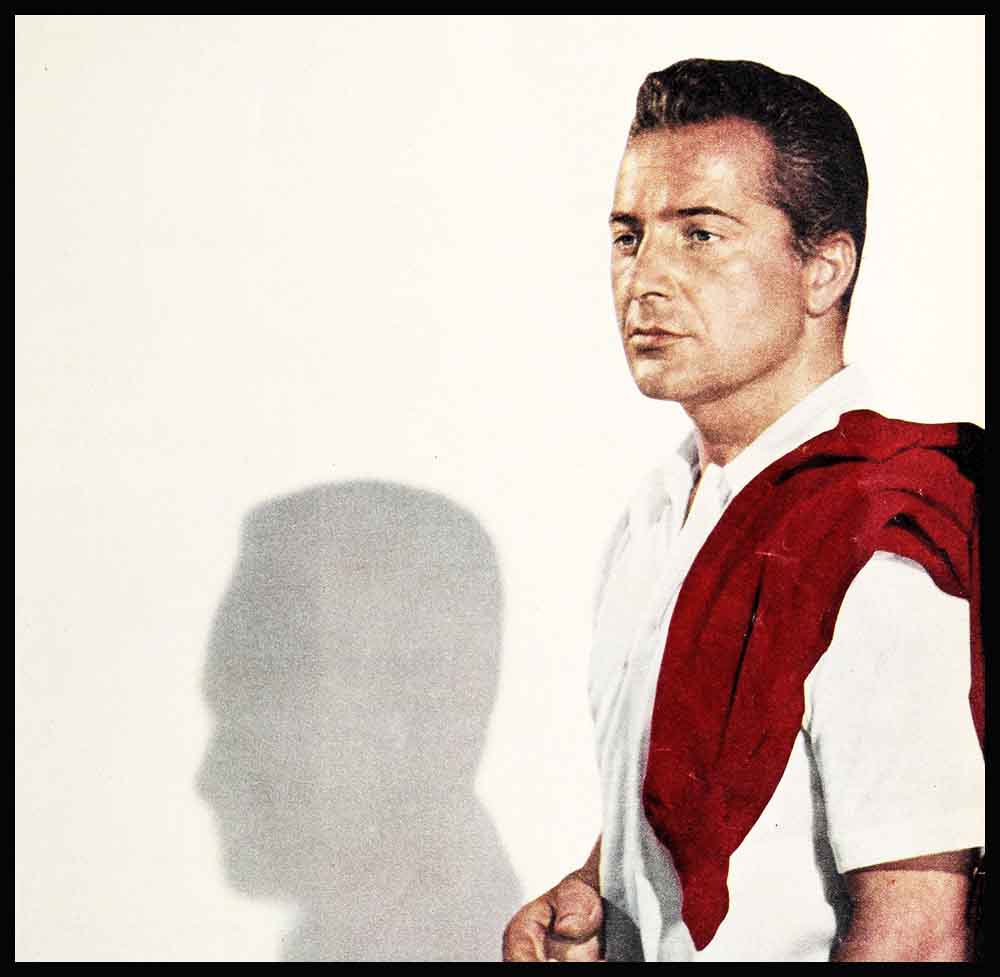
How to Have A Love Affair?
“There are,” said Rossano Brazzi, “comparatively few unhappy marriages in Italy. I believe the reason is that Italian wives are wise enough to realize that simply because a man is married does not mean he automatically loses all interest in the opposite sex. And if a husband flirts a little now and then—where is the harm in that? Unless, of course, some busybody takes something innocent and blows it into something big. Then someone gets hurt. That is bad. Very bad.
“It is also,” Rossano announced flatly and firmly, “foolish and unnecessary.”
The place where this conversation occurred was perfect for such talk. It was a comfortably furnished living room in a small London town house, located almost within the shadows of Buckingham Palace. The room bore the unmistakable signs of a woman’s touch, a woman’s occupancy—the richness of the pale blue drapery fabrics at the tall windows, the flowers atop the mahogany piano, the delicate Venetian glass and crystal that graced table tops and man tel. The woman who was responsible for these touches, however, was nowhere in sight. Rossano Brazzi lounged back in a deeply upholstered black leather chair. He wore a dark red smoking jacket and black patent leather slippers. He sipped at a Scotch and soda in the manner of a “Man of Distinction.” He inhaled long and deeply on a strong French cigarette—and they are, by the way, the strongest in the world. He was the picture of a true sophisticate, handsome and debonair.
AUDIO BOOK
He also looked happy, contented, at ease. And he was.
“Please understand me,” he said, with a trace of anxiety in his low, deep-timbred voice, leaning forward and looking very sincere, “I am not advocating the double Standard. I am not suggesting that married men should flirt. I am only saying that if a man flirts, he should not permit his wife to be hurt by his foolishness. Take me, for example. I love my wife. We have been happily married for seventeen years. But,” he set his drink down with a gesture of vehemence, and a note of defiance crept into his voice, “why should I not have the pleasure of looking admiringly at another woman—even, on occasion, of taking her to dinner? Should such a simple thing bring on tears? Recriminations? Should it send my wife rushing to the divorce court? Should it ruin our happiness?” He answered his own questions with, “Nonsense!”
I agreed. However, didn’t his attitude, while sensible in theory, require a certain amount of trust and understanding on the part of the wife? Any wife?
Rossano nodded. “But,” he went on, “actually, I do not believe it is the harmless little flirtation itself to which the wife objects. It is the way in which it is handled. You see, as I said before, the important thing is to handle it all in such a way that no one is hurt. How does a husband take some other woman out to dinner without hurting his wife? Why, by being careful to see to it that she does not know about it.”
And if his wife should happen to ask where her husband was until eleven o’clock that particular night?
“Ah, but that is just it. She doesn’t ask. At least,” and a fond, warm look came over his handsome Latin face, “my wife doesn’t. My wife is a wise woman. A very wise woman. For instance—”
He leaned back, stretched his legs out in front of him, and lit a new cigarette with a small gold monogrammed lighter. His every gesture was charming, smooth, dramatic. Almost too smooth, too dramatic. Did he really mean these things he was saying, or was he kidding? It didn’t really matter. They still made good listening.
“First of all,” Rossano continued, “let us suppose Lidia, my wife, expects me home for dinner at seven o’clock. Let us also suppose that somewhere in the course of the day, I have met a woman who intrigues me—who, for any one of a half-dozen reasons, I would like to know better. I ask her to dine with me. She promptly says, ‘But you’re married.’ I promptly answer, ‘But of course I am married.’ She then says—and you would be amazed how consistent women are in their replies to these things!—‘Then how can you have dinner with me?’ My reply is always the same. ‘My dear,’ I assure this young woman, ‘I did not ask you to marry me. I merely asked you to dine with me this evening.’ ”
It was now my turn to lean forward. “And then?”
“And then,” smiled Brazzi, looking like a cat who has eaten a particularly tempting canary, “I call Lidia. I am careful to call her in plenty of time so that I am not ruining a meal which she has gone to particular pains to prepare. I am very polite, naturally. And regretful; also naturally. I casually mention a script conference, a rehearsal. I tell her exactly what time I shall be home—and I am always home within halt an hour of that time.”
But if this charming little flirtation is to remain charming, if it is to remain in the memory of both as a delightful interlude, everything must be carefully planned and nothing left to chance. Where, for instance, will they go for dinner?
“Someplace out of doors, if the weather is nice. In Rome,” he sighed, remembering, “the weather is almost always nice. Blue skies, whitewashed buildings, a little restaurant atop a hill, perhaps one overlooking the Mediterranean. At such a place,” he said, “there is almost no possibility of encountering someone I know who might later tell my wife and, of course, make quite a story out of something that is not at all important unless someone chooses to make it so.”
Rossano returned to his drink. He sipped it thoughtfully. “There are many ways of handling these situations, but the best rule always is, quite simply, to use good taste.”
Again I had to mention that it seemed to me these arrangements always required cooperation. Granted, Rossano’s wife was most cooperative in not asking questions. Now supposing this young woman, with whom he wanted nothing more than a pleasant evening of talk, should impulsively lean forward, as he was bidding her good night, and leave a smudge of lipstick on his collar? There have even been times, I mentioned, when women have been known to do such things quite deliberately, in order to disturb exactly the kind of happy and understanding marriage which Rossano Brazzi unquestionably enjoys with his Lidia.
Rossano put down his glass with a clatter. He looked at me angrily, as though I had been guilty of such a breach of romantic ethics.
“A man is a fool to get himself into such an untidy situation! Lipstick on a handkerchief? Throw the confounded thing away. Lipstick on a collar? I carry an extra shirt with me at all times. Sometimes, quite innocently, finishing up a love scene with a leading lady or something, she leaves such a smudge on my collar. I change my shirt. If necessary, I would throw away the shirt. I would never come home to my wife with powder on my collar or a blonde hair on my lapel.” Instinctively, he reached up and brushed his lapel on this last remark.
“And if your wife should, ask you, when you get home, whether you had been out with another woman?”
Brazzi’s eyebrows shot up abruptly. “Lidia would not dream of doing such a thing. A clever wife—and my wife is very clever—does not ask her husband if he has been seeing some other woman. She might think it, but until he tells her so, she doesn’t know it. If she does not ask, he cannot tell her. A wife must trust her husband implicitly, and he must know that she does.”
Trust, Brazzi declared gravely and seriously, is the most binding and enduring quality in any marriage. “The very first minute a woman starts doubting her mate, the union is over. And jealousy!” Rossano threw up his hands. “Jealousy can kill a marriage in one blow. But always remember, it takes two to start jealousy.” He leaned back, looking very wise. “A sensible husband never gives his wife a reason to be jealous.”
To illustrate his point, Rossano described a typical evening out with his wife. He and Lidia might be dining at a smart restaurant. Perhaps there is a striking, magnificently dressed beauty at the next table. Brazzi sees her—out of the corner of his eye—but that’s all! At all times, he shows the utmost consideration for his wife. He never, never smirks and remarks, “Boy, what a gorgeous dish!”
He raised a forefinger. “That,” he declared, “is where my wife is clever. She is the first one to draw my attention to the attractive woman. She is the first one to comment, ‘Isn’t she lovely!’ ” Rossano shrugged. “What can a man say then?”
Rossano said that he met Lidia when they both were sixteen, attending the same school in Florence. At twenty-one, they were married. Rossano studied law and began practicing in Rome. Then one summer he appeared in an amateur theatrical production, a film producer noticed him and signed him to a movie contract, and he has been an actor ever since.
“Suddenly, I was thrust into a business where I saw dozens of exciting women all around me. Naturally, like any red-blooded Latin, I was tempted. But Lidia is not, somehow, the kind of wife to whom one is unfaithful. She is too intelligent, too understanding. By giving me the little freedoms she keeps me happy, content. And I think if I were to start my life over again and marry again, I would still choose Lidia.”
Why?
“Because Lidia is the perfect wife,” Brazzi answered promptly. “She manages the home beautifully. My breakfast is ready on time. My shirts, ties, suits are always clean and in order. She takes down my telephone messages, reads my Scripts with me, discusses contracts. She praises me only when I deserve it. She never gushes. She’s real. She’s honest.”
We began comparing the average Italian wife to her American counterpart. We discussed a fact Rossano had brought up earlier, that there are so many more divorces in America than in any country in Europe. Brazzi thought this was partly because American husbands and wives, though they loved each other very much, didn’t respect one another as European husbands and wives do.
“That is,” he said, “they do not respect one another’s right to privacy, to having a little part of themselves that belongs to no one else. A little room, shall we say, marked, ‘No admittance.’ ”
On the other hand, Rossano said he was sympathetic toward American marital troubles, because he feels the United States, compared with Italy, is still an infant nation. “We’ve had centuries of experience,” he philosophized. “Italian men and women are born with a talent to cope with these problems.”
But doesn’t Lidia ever phone to say she won’t be home for dinner? That she’s playing bridge, say, or its Italian equivalent, as American wives sometimes do?
“Never!” replied Rossano emphatically. “Oh, she may do those things during the day—by the hour, in fact—but she’s home in time to prepare a good dinner. The house is always in order. Fresh flowers are on the table. When I walk in, I have the feeling she’s waiting for me. That’s one of the most important things in marriage—to know that someone is waiting.”
There are other things, too, in the Brazzi match which make it a happy union—in spite of what Rossano insists on confessing is a slightly roving eye. Money, for example. Rossano said his wife never has to ask him for enough cash to get through the day. They have a joint bank account, and Lidia writes a check whenever she needs to. He spends what he likes. “I make the money,” he declared. “But it’s ours”
And then there is thoughtfulness. If Lidia has stitched up a new slipcover for a chair, Rossano notices it as soon as he enters the room. He remarks about the slipcover, praises his wife, gives her a big hug for making his home more attractive.
“Anniversaries and birthdays are not forgotten, either,” Rossano smiled. “As a matter of fact, we celebrate our wedding anniversary for a whole week. One night, we have a big party at our house. The next night, we may go to the theatre. The third night, we go to a friend’s home. And finally, on the last night, we have our own private celebration just by ourselves.” In spite of seventeen years of married life, Rossano said he and Lidia seem to have retained the same romantic feelings they had for one another the first day they met.
“Above all,” Rossano admitted with a somewhat sheepish grin, “when a man feels he is free to flirt, it is surprising how much of the fun is taken out of it!”
Drawing on his own experience for an example of this, he told about his trip to the United States a couple of years ago. “The studio asked me to go over to make personal appearances, publicizing ‘Summertime,’ ” he recalled. “They wanted me to come alone, feeling I’d make a more romantic impression without my wife.”
Rossano said he discussed the proposed jaunt with Lidia, and she very wisely left the decision up to him. “I decided to make the trip,” the actor continued. “Of course, in the back of my head, I was thinking, ‘Oh, this is going to be great! Traveling all around—free—a bachelor.’ ”
Full of anticipation, a gleam in his eye and a selection of natty new suits in his trunk, Rossano boarded a liner for New York. He was going to have himself a hail! Well, it all started out fine. Every afternoon, he sipped cocktails with the loveliest ladies on shipboard. Every evening, he dined and danced with a different beauty. He was the charming, beguiling Latin lover, the darling of the female passenger list, the romantic Rossano Brazzi, who left each girl palpitating and breathless. But what happened to Rossano?
“A week later,” he declared, “I arrived in New York. Do you know what?” He sighed heavily. “I was homesick! I missed Lidia so terribly much, I started phoning her every night.”
And then, like the well-trained actor responding to a cue, Rossano asked if I’d like to meet Lidia. I instantly said, “By all means, yes!”
He opened the living room door and called upstairs. A pleasant, easy feminine voice called down in Italian to say that she wasn’t properly dressed. Her husband assured her it didn’t matter. This was a friend, and female. In a minute, Lidia appeared, pink and plump and bubbly, in a frothy, lacy negligee. I explained that we’d been discussing her marriage. Naturally, I didn’t want to leave without meeting her. She beamed happily at her husband.
“We have a wonderful life,” she declared. You could tell at once by her calmness and by her smile that here was a wife who understood her husband thoroughly and enjoyed him thoroughly.
“Mrs. Brazzi, how do you feel about his leading women? Are you ever jealous, say, of your husband’s love scenes with them?”
“Nonsense!” said Lidia, much as her husband had said half an hour before. “I love his leading women. Rossano is working no w with Joan Crawford in ‘The Golden Virgin.’ Miss Crawford is sweet and intelligent. I admire her greatly.”
The next question was such a bold one, I all but trembled when I asked it. “What would you do if you ever found out there was another woman in your husband’s life?”
The room was abruptly filled with peal after peal of resounding laughter. “Another woman? Ridiculous!” Lidia was rocking with merriment. “Oh, he looks! What Italian doesn’t? But anything serious?” She was still holding her sides. “Oh, no—not Rossano! When a man is happy at home, he stays there. And Rossano is happy—very happy.”
“Then your marriage has been successful?”
“The best!” said Lidia, her hands in the air in a typical Italian gesture. “We are—how you say?—compatible. We have fun. Rossano brings home little presents to surprise me. I cook his favorite dishes. In our apartment in Rome, we are always planning parties. We go motoring in Italy—all over. We enjoy doing everything together.”
Rossano was looking a little wistful. “I would hate to think what life would be without my wife,” he declared, his voice strangely low. “We have grown together. You might almost say, grown up, together.”
“Then there never could be a separation or divorce for the Brazzis?”
Rossano shook his head, not only to make a negative gesture, but to indicate his wonderment, his puzzlement at such a question. “You Americans,” he said, “you do not understand love. Maybe, once in a while, I flirt. Maybe, even,” with a wink in her direction, “Lidia flirts. What has this to do with a happy marriage? Divorce? Never!”
Rossano drained the last of his drink, as though to toast his pledge—and the woman he married who still acts like a bride. An aromatic scent of tomato sauce and garlic came floating through the living room. I mentioned something about dinnertime and said I’d better be leaving.
Rossano Brazzi saw me to the door. “I’d like to ask you something,” he said, speaking quickly and quietly. “My studio wants me to come to America on a personal appearance tour for the new picture. Do you think I should go?”
‘Without Lidia?”
Rossano nodded. Then he caught my thought, and the hopeful look slowly faded from his face. “You are right,” he said, resigning himself to it once more. “it wouldn’t really be any fun without Lidia. Married men,” he said, “they never learn!”
We shook hands. The door closed softly behind me and I walked out into the gray, penetrating London fog. Oddly, I felt lonely, for no special reason. It had something to do with the smell of dinner cooking, with a woman’s warm, rich, happy laughter, with a feeling I had that, behind that closed door, two people in love had already gone into one another’s arms. I somehow knew that at this moment Rossano would be kissing his wife tenderly, laughing softly down into her upturned, worshiping face.
People have said, “How can a woman like Lidia, who is charming, yes, but who makes no effort to be svelte or stylish, continue to hold the love of a man like Brazzi—a man who, as an actor, is constantly exposed to some of the most beautiful women in the world?”
I knew. Lidia knew. She is always there, waiting for him, and he knew it. And, “When a man is happy at home, he stays there.”
Maybe men never learn. But women do. I did.
THE END
PLAN TO SEE: Rossano Brazzi in U-I’s “Interlude.”
It is a quote. PHOTOPLAY MAGAZINE FEBRUARY 1957
AUDIO BOOK

